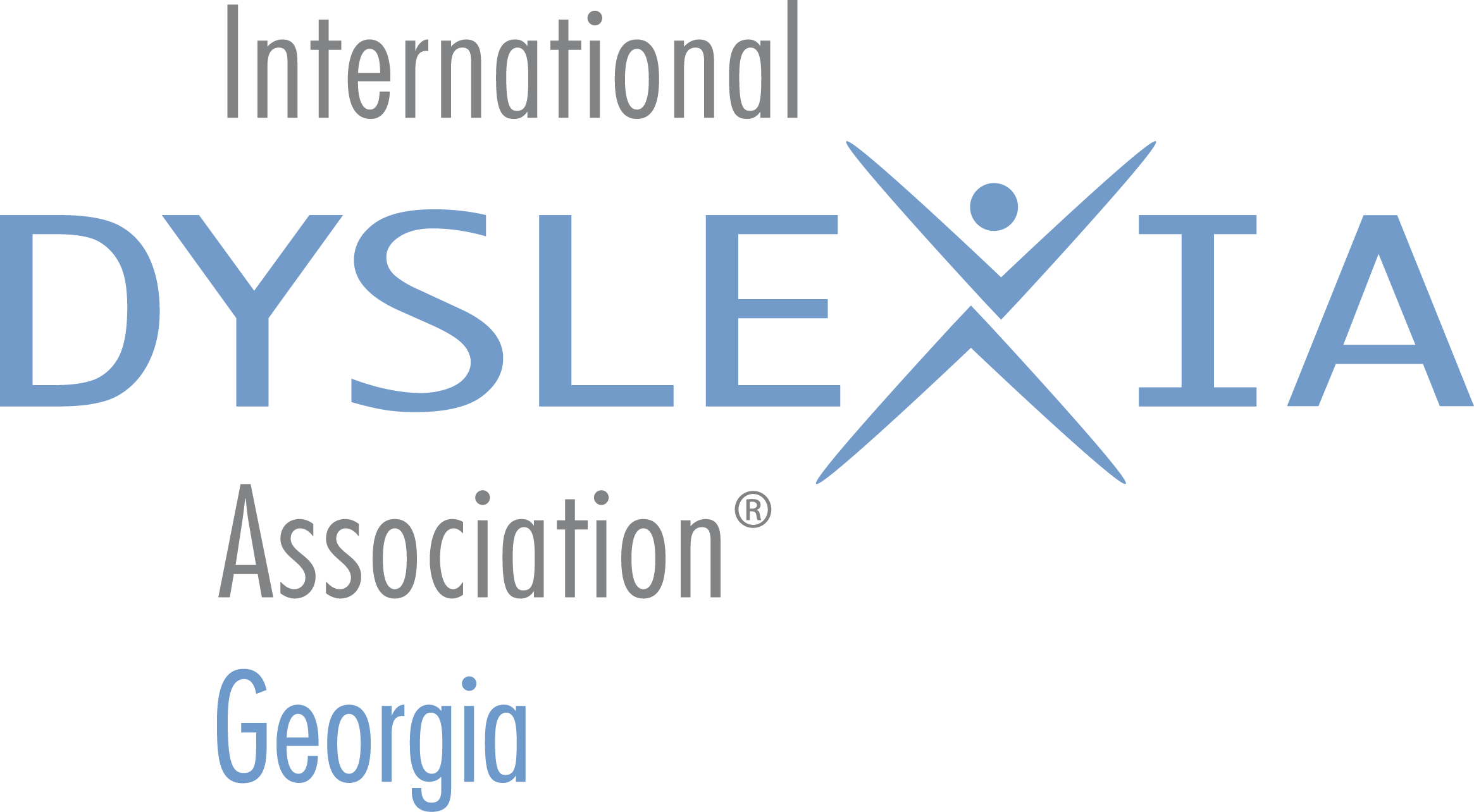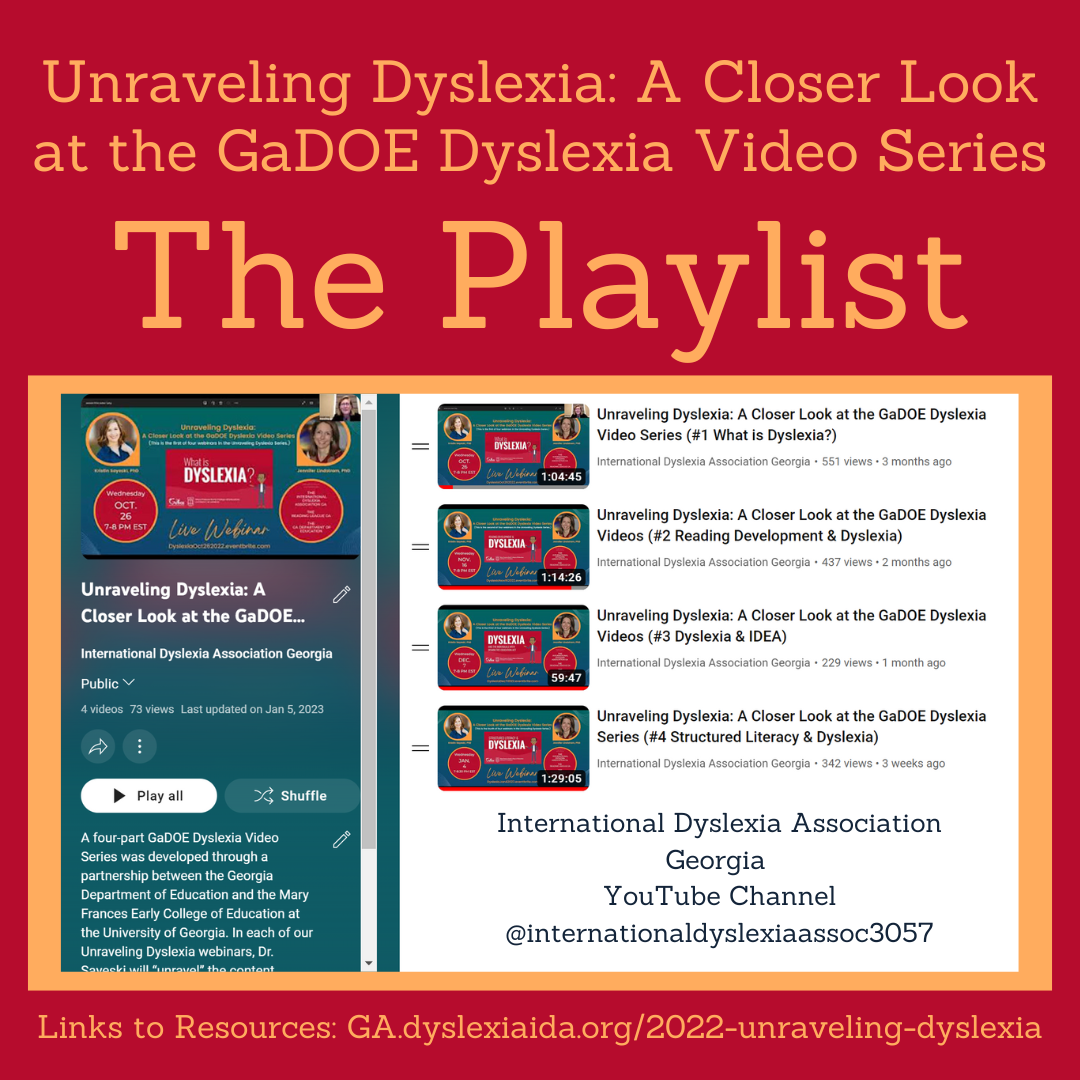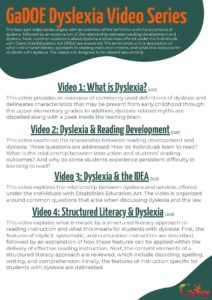We are in the process of compiling a list of trusted resources to answer Frequently Asked Questions. This page is a working document that is frequently updated.
Search Website
In addition to information on this page, we have valuable information woven throughout this website. To find this information, use the “Search IDA-GA” feature. Enter a keyword, and click on the link to the page or post.
SPOTLIGHT:
What You Need to Know About Dyslexia by Josh Clark (Nov. 8, 2023, Webinar, Landmark Learns Parent Education)
Answering the Internet’s Questions About Dyslexia by Tim Odegard (Oct. 6, 2023, Center for Dyslexia MTSU YouTube)
How Brains Learn to Read and Dyslexia with Nadine Gaab (Oct. 2023, Melissa and Lori Love Literacy Podcast Ep. 165)
Comprehensive Resource Libraries
- Webinars – International Dyslexia Association Georgia YouTube Channel
- International Dyslexia Association Dyslexia Digital Library
- International Dyslexia Association Newsletter – The Examiner
- Georgia Department of Education: Dyslexia
- Haskins Laboratory Resource Library (Content is added or modified on a regular basis.)
- Neuhaus Education Center Reading Teachers Network Library
- Gaab Lab Research Team Boston Children’s Hospital, Dyslexia Resource Packet
- National Center on Improving Literacy – Dyslexia
- Institute of Education Sciences – IES Practice Guides
Pages and Posts Added to the IDA-GA Website:
- In the New York Times News: In Memphis, Phonics Comes to High School (Dec.27, 2022)
“Literacy lessons are embedded in every academic class…” - Print-to-Speech and Speech-to-Print: Mapping Early Literacy, a consensus article by the “Reading Peaceniks” (Dec. 15, 2022)
- The Reading Brain: How We Learn to Read – Hill Learning Center’s 4 min. video based on S. Dehaene’s work (Sept. 2022)
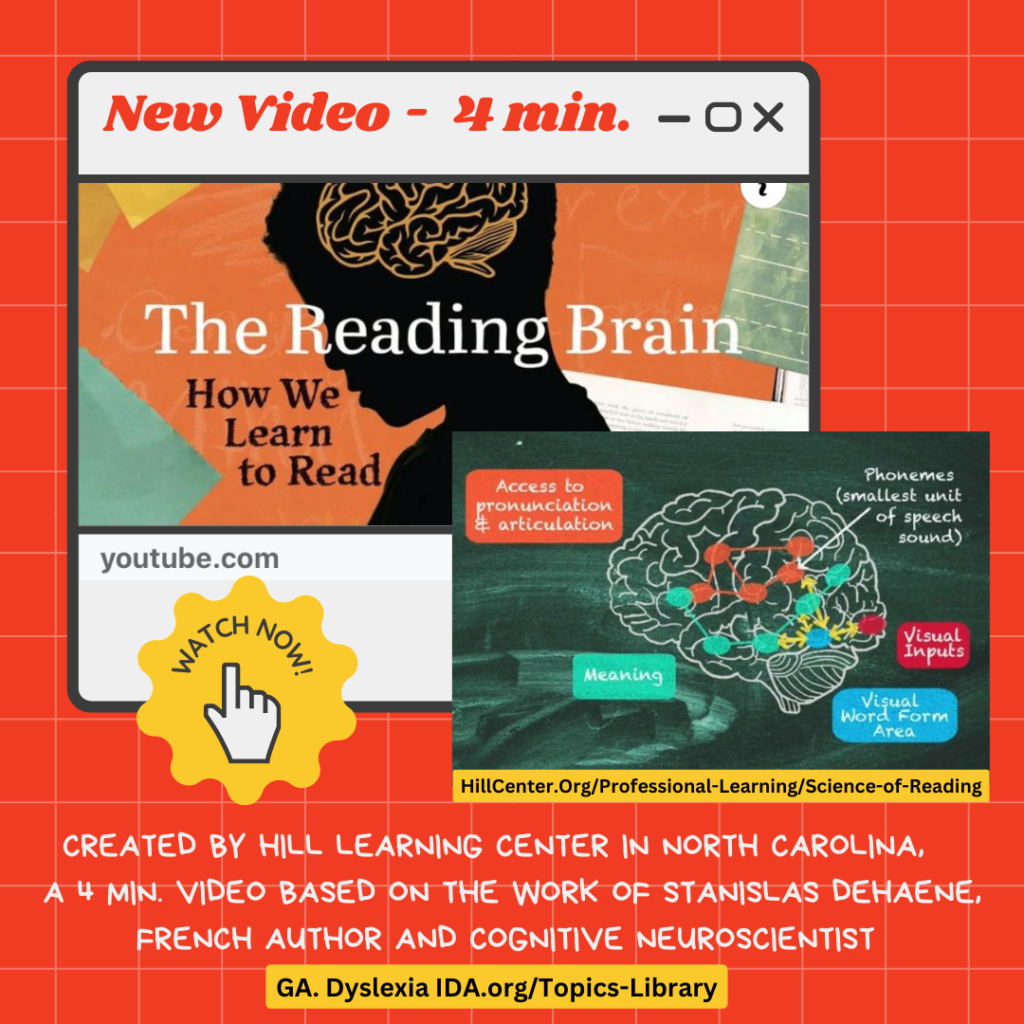
- A Look into Language, Language Disorders, and Dyslexia
https://ga.dyslexiaida.org/language-disorders-and-dyslexia/ - Math and Dyslexia (March 22, 2023)
https://ga.dyslexiaida.org/math-and-dyslexia/
IDA-GA & TRL-GA 2023 Spotlight on Structured Literacy Series January – March 2023
Recordings and Recommended Resources: https://ga.dyslexiaida.org/2023spotlightsl/ 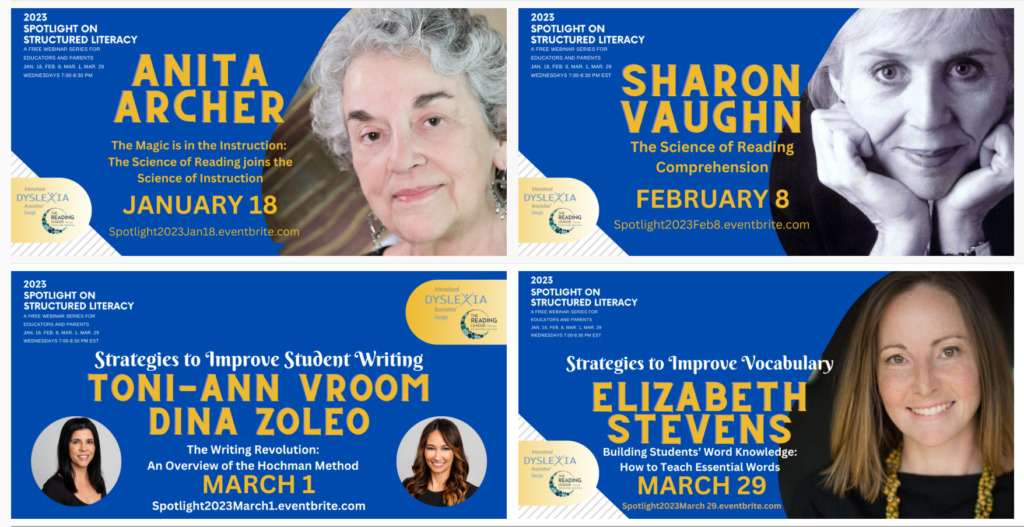
IDA-GA, TRL-GA, & GaDOE Webinar Series Oct. 2022-Jan. 2023
Unraveling Dyslexia: A Closer Look at the GaDOE Dyslexia Video Series
Georgia Department of Education Dyslexia Video Series
Published April 25, 2022
Click HERE for a shareable flyer with clickable links to each video as well as transcripts.
The videos are designed to be viewed sequentially.
For questions, contact Franeka Colley at franeka.colley@doe.k12.ga.us or Jennifer Lindstrom at jennifer.lindstrom@doe.k12.ga.us.
Georgia Department of Education Dyslexia Handbook and Other State Dyslexia Guides
- Georgia Department of Education Dyslexia Handbook (Updated 1/2022)
- GA Professional Standards Commission Dyslexia Endorsement Guidance Document (July 2020, Rule 505-3-.112)
- Massachusetts Department of Education Dyslexia Guidelines (Updated 1/17/2019)
- Arkansas Board of Education R.I.S.E. Arkansas Science of Reading Resources (Updated frequently and added here 6/26/2021)
What is the Science of Reading (SoR)?
See below and also visit IDA-GA’s Science of Reading Resource page for infographics, articles, and more: https://ga.dyslexiaida.org/science-of-reading-resources
Now Available (January 2022): The Science of Reading: Defining Guide provides a firm definition of what the science of reading is, what it is not, and how all stakeholders can understand its potential to transform reading instruction. Request the free eBook The Science of Reading: A Defining Guide (2022) HERE. Hard copies are available for $7.99.
“Improving Teacher Knowledge Around the Science of Reading” presented by IDA-GA Board Member Nora Schlesinger, Ph.D. (February 2021)
Structured Literacy: Until Everyone Can Read
- Louisa Moats, Ed.D. (2020 Fox Reading Conference, “Explicit Language Instruction is the Heart of Structured Literacy”)
- Tom Odegard, Ph.D., CALP (2020 Fox Reading Conference, Moderator – Q&A – Listen beginning at 3:54:24)
- EFFECTIVE READING INSTRUCTION (Scroll down to What is Structured Literacy?)
Exploring Components of Structured Literacy
- Morphology
A key component of effective reading instruction is showing students how morphology fits into our language. English is a MORPHOphonemic language. Learn more at https://ga.dyslexiaida.org/morphology/
Remembering Legends in the Field
- Diana Hanbury King (1927-2018) https://dyslexiaida.org/the-legendary-diana-hanbury-king/
- William Van Cleave (1968-2020) https://wakelet.com/wake/XuIDNfx7OXoxLImeFyalj
The 2021 IDA-GA Dyslexia Knowledge Series
Access the full series here: GA.dyslexiaida.org/2021-ida-dyslexia-knowledge-series-wednesday-webinars/
- “FCRR – Advancing Reading Through Science” with Nicole Patton Terry, Ph.D.
- “What Educators Need to Know About Dyslexia Training Programs” with Nora Schlesinger, Ph.D. & Jennifer Lindstrom, Ph.D.
- “Dyslexia: What It Is and What Kind of Instruction Will Help” with Devin Kearns, Ph.D.
Early Identification and Early Intervention MATTERS
Fumiko Hoeft, MD, Ph.D. and Margie B. Gillis, Ed.D. (March 31, 2021, Webinar, “Dyslexia: The Science and Practice of Early Identification”)
In recent years, findings from scientific research in education, psychology, genetics, and the neurosciences have increased our understanding of dyslexia and the importance of early identification and instruction for young children. In this webinar, Dr. Hoeft will discuss the different components of science and neuroscience informing the development of early screeners that assess school readiness and dyslexia risk in young learners. Dr. Gillis will continue the discussion on how young children identified as being at risk for dyslexia will respond to developmentally appropriate instruction.
Participants will learn activities and techniques that will engage children in learning all-important oral language and preliteracy skills to help ensure their readiness for school and future reading success. Dr. Hoeft will also provide demonstrations of a universal screener, APPRISE, developed by scientists at Curious Learning, UCSF, UConn, and MIT that is a free open-source mobile app measuring a range of literacy and cognitive skills in young children ages four to eight.
Universal Screening
- Universal Screening for Reading Difficulties: Overview, The Importance of Early Identification, Screening Tools – Selection and Use, Options After Screening (Compilation by Decoding Dyslexia California)
- Compilation of various articles on the topic of Screening (National Center on Improving Literacy)
- Petscher, Y., Fien, H., Stanley, C., Gearin, B., Gaab, N., Fletcher, J.M., & Johnson, E. (2019). Screening for Dyslexia. Retrieved from improvingliteracy.org.
- Gaab Lab Early Literacy Assessment / Screener Resources and List (Gaab Lab, Updated on an Ongoing Basis)
- Screening for Dyslexia presented by Jennifer H. Lindstrom, Ph.D. (4/23/2021 How to Choose a Universal Screener Webinar Presentation for the GaDOE) Click here to view slides.
The Brain & Reading
-
How Brains Learn to Read and Dyslexia with Nadine Gaab (Oct. 2023, Melissa and Lori Love Literacy Podcast Ep. 165)
-
The Reading Brain: How We Learn to Read – Hill Learning Center’s 4 min. video based on Dehaene’s work (Sept. 2022)
- Devin Kearns, Ph.D., Roeland Hancock, Fumiko Hoeft, Kenneth R. Pugh, Stephen J. Frost (2018 Teaching Exceptional Children, “The Neurobiology of Dyslexia”)
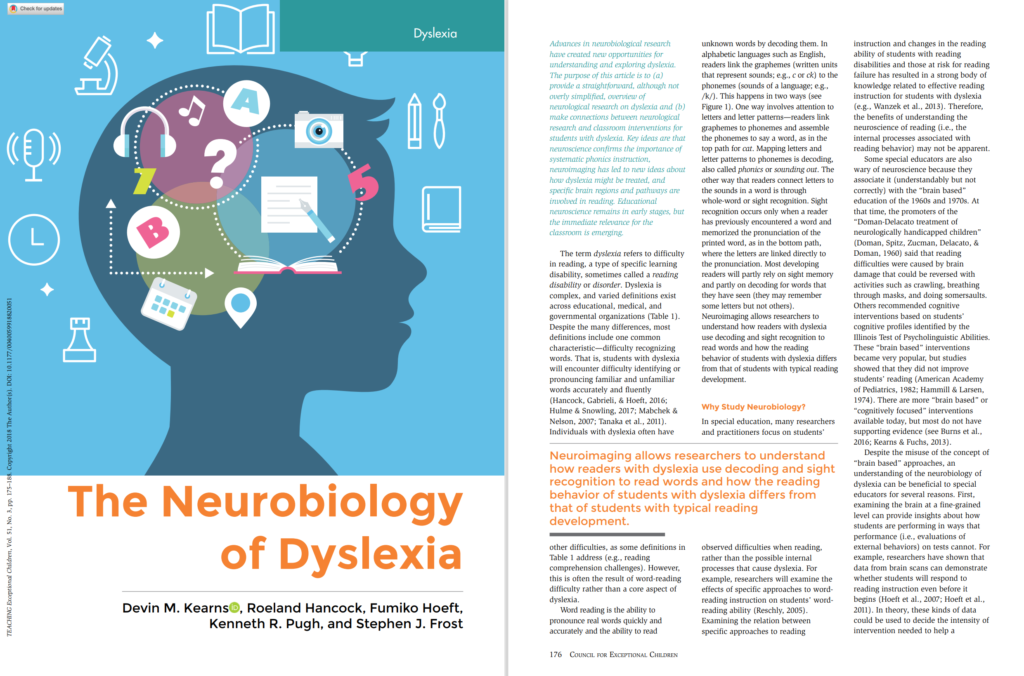
- Kenneth Pugh, Ph.D. (AIM Expert Minutes)
- Kenneth Pugh, Ph.D. (READ – Research Education Podcast – Episode 11: Using Science to Decode the Literacy Crisis)
- Stanislas Dehaene, Ph.D. (2016, The Brain Prize)
- Denise Eide (2019, Logic of English, “The Science of Reading: How the Brain Learns to Read”) In this 34-minute video presentation, Denise Eide provides a thorough yet concise and easy-to-understand explanation of reading brain research. She references Stanislas Dehaene’s book Reading in the Brain: The New Science of How We Read. At minute 18:40 Ms. Eide discusses the excerpt that has been widely shared – and misunderstood – across social media that begins “Aoccdrnig to a research at Cmabridge Uinervtisy…”
Dyslexia 101 – Understanding Dyslexia Basics
- Jennings Miller, M.Ed., Fellow/OGA (October 5, 2021, IDA-GA Outreach Webinar, What IS Dyslexia?)
- Jennifer Hasser, M.Ed. (May 2021, Struggling Readers: What to Do & When to Worry)
The presentation begins a 4:45. Beginning at 7:42, this video addresses the following: Warning Signs, Components of a Quality Reading Program, Identification & Assessment, Intervention. At 58 minutes, Q&A: Should a child be retained? How should I communicate all this with the school? What about computer programs for intervention? What about a child with autism who is on the spectrum who decodes well yet struggles with comprehension? What is the difference between a reading disability and dyslexia? - Jennifer Lindstrom, Ph.D. (March 16, 2021, GaDOE, A Deep Dive Into Dyslexia: What is Dyslexia? What Do We Know About It?)
- Nora Schlesinger, Ph.D. (November 9, 2020, GaDOE, Basic Understanding of Dyslexia and Foundational Structured Language Instruction)
- Renee Bernhardt, Ed.S., CDT (November 2020, Digging into Dyslexia)
- Noel Gunther, Suzanne Carreker, Ph.D., CALT-QI, Elizabeth Liptak, Nicole Lubar, Latrice Seals, Ed.D., Louise Spear-Swerling, Ph.D. (Reading Rockets Reading 101: A Guide to Teaching Reading and Writing) Reading Rocket’s Reading 101 is a free, self-paced professional development course for K-3 teachers. The program provides teachers with an in-depth knowledge of reading and writing so they are prepared to guide their students into becoming skilled and enthusiastic readers and writers. Reading 101 was developed by Reading Rockets and produced in collaboration with the Center for Effective Reading Instruction and The International Dyslexia Association.
- Mary Yarmus, M.Ed., LDT, CALT (2017 Breakout Session at IDA Conference)
- Jennifer Hasser, M.Ed. (2020 Outreach Webinar)
- Margie Gillis, Ed.D. (Understood.org’s Key Takeaways from Reading Experts – short 3:32 min video)
- Holly Korbey (Nov. 2019, The MindShift Guide to Understanding Dyslexia, a 41-page PDF)
Multisensory Learning Strategies
- Louisa Moats, Ed.D. (2020 Fox Reading Conference, Listen at 4:05:27, Q: Louisa Moats answers the question of multisensory learning strategies: “Oral language paired with written language is by its very nature a multisensory integrated process. It’s multimodal, integrative learning of oral and written language. It really is a fundamental principle of learning. It engages the learner and that helps them pay more attention.” )
Debunking Myths about Dyslexia and Reading Instruction
- Nadine Gaab, Ph.D. (www.gaablab.com, https://www.gaablab.com/dyslexia-myths)
- Unraveling Dyslexia Webinar Series
- Sold a Story by Emily Hanford (Series Podcast October – November 2022) – Approx. 45 minutes each. Transcripts available.
Screening for Reading Impairments
Phonemic Awareness, Orthographic Mapping, and Word Study
- Wesley A. Hoover, Ph.D. (“The Importance of Phonemic Awareness in Learning to Read,” published in SEDL Letter Volume XIV, Number 3, December 2002, Putting Reading First. Wes Hoover is SEDL president and CEO. He holds a doctorate from The University of Texas at Austin in human experimental psychology, with a specialization in reading and psycholinguistics.)
- Susan Hall, Ph.D. (95 Percent Group Kilpatrick Webinar Series)
- Jennifer Buckingham, Ph.D. and Kathryn Garforth, Ph.D. (December 2020, Orthographic Mapping)
This is a recording of a conversation between Dr. Kathryn Garforth & Dr. Jennifer Buckingham about Orthographic Mapping. Orthographic Mapping refers to the process readers use to create connections in our brains between the printed words, their pronunciations, and meanings in our memory so that we can recognize them within a fraction of a second. It is essential for reading fluency. - Jennifer Hasser, M.Ed. (2019 Outreach Webinar, The Usual Suspects: Rule-Breaking Sight Words and How to Teach Them)
- How to Teach Blending (2022 Rooted in Language YouTube – 2 min. clip on a continuous blending strategy)
Addressing the Needs of Older Students
- In the New York Times News: In Memphis, Phonics Comes to High School (Dec.27, 2022)
“Literacy lessons are embedded in every academic class…”
Teaching Writing
- Judith Hochman, Ph.D., Toni-Ann Vroom, & Dina Zoleo (2020, TWR Free Online Resources – Templates, Activities, Tips Webinars)
Reading with Your Child
- Middle Tennessee State University (2020, Tennessee Center for Study and Treatment of Dyslexia)
Pencil Grip
- Neuhaus Education Center (a 20-second video demonstration of an effective strategy for setting up the proper pencil grip)
Oral Language and World Knowledge
- Neuhaus Education Center (neuhaus.org, Oral Language and World Knowledge Screening)
Oral Language and Listening Comprehension
A Look into Language, Language Disorders, and Dyslexia
- https://ga.dyslexiaida.org/language-disorders-and-dyslexia/
How are math, language, and dyslexia connected?
GA.dyslexiaida.org/language-and-math-connection
- N. Wexler (6/21/22 Forbes.com, “When Language Prevents Kids From Succeeding At Math”)
https://ga.dyslexiaida.org/language-and-math-connection/
Vocabulary
- Kyle Redford (Yale Center for Dyslexia and Creativity, “How Teachers Can Build a Word-Rich Life for Dyslexics”)
Listening and Reading Comprehension
- Neuhaus Education Center (neuhaus.org, Listening and Reading Comprehension Screening for Grades 2-5)
A deep, rich understanding of text, reading comprehension, is the ultimate goal of all reading instruction. Reading comprehension can be disrupted by multiple factors, and it is the job of the reading teacher to determine where instruction needs to begin. With these listening and reading comprehension screenings, teachers can determine if reading comprehension difficulties are due to poor basic word recognition skills, poor vocabulary, poor background knowledge, poor listening comprehension, or a combination of factors.
Comprehension
- Neuhaus Education Center (neuhaus.org, Retelling Rubric)
“Story retelling gives a good indication of a reader’s understanding, yet it is difficult to assess in a way that informs instruction. This informal rubric for assessing retelling can give screening, formative, and summative information about a student’s ability to translate ideas from stories into words. The rubric assessment can be included in student portfolios and used as RTI data.”
Supporting Comprehension Through Writing About Reading
- Joan Sedita, M.Ed. (September 2020, IDA Dyslexia Webinar)
Research indicates that writing about reading supports comprehension. Learn practical suggestions for structured, explicit teaching of strategies for writing about text in any subject across grades 3 to 12. Several strategies will be addressed including summarizing, personal response to narrative text, and writing from informational sources. Presentation Handout – https://app.box.com/s/8azqe1iu9a9giza…
Code-Switching in “Bi-dialectical” Speakers
- J. Washington and M. Seidenberg on “Teaching Reading to African American Children: When Home and School Language Differ” (Summer 2021, American Educator)
- William Brennan on “Julie Washington’s Quest to Get Schools to Respect African-American English” (April 2018, The Atlantic)
Advocating for Students with Dyslexia
- Pete W.D. Wright, Esq. (Nov. 2, 2020 International Dyslexia Association Webinar, “Advocating for Students with Dyslexia“)
PaTTAN (Pennsylvania Training and Technical Assistance Network) Conference 2020
Free Webinars
For parents and teachers who are not able to attend outreach events, free webinars now exist that provide excellent learning opportunities for professionals, parents, and advocates. These webinars are meant to empower educational professionals and families with knowledge and resources to address the instructional needs of students who have dyslexia and other learning differences.
Free Webinars Offered by the Ontario Branch of IDA
Free Webinars Offered by the Upper Midwest Branch of IDA
Free Webinars Offered by the Georgia Branch of IDA
Free Webinars Offered by IDA (Home Office)
IDA offers the following free recorded webinars presented by Patricia Mathes, Ph.D., Texas Instruments Chair of Evidence-Based Education and Professor of Teaching And Learning, Southern Methodist University, Editor-in-Chief of IDA’s Annals of Dyslexia and Founder of Hoot Education.
IDA invited Dr. Louisa Moats to discuss how IDA’s Knowledge and Practice Standards can improve reading instruction for ALL students. Louisa Moats, Ed.D., is President of Moats Associates Consulting, Inc. and has served as a National Board member and Vice President of IDA. She earned her M.A. in Learning Disabilities/Special Education at Peabody College of Vanderbilt and her doctorate in Reading and Human Development from the Harvard Graduate School of Education.
- IDA’s Knowledge and Practice Standards: How They Can Improve Reading Instruction for All Students (10/12/16)
- Additional Webinars (2018, 2019, 2020) by Louisa Moats: www.louisamoats.com
IDA invited Dr. Suzanne Carreker to discuss the certifications IDA issues that recognize professionals with the knowledge and skills to teach individuals with dyslexia to read. Suzanne Carreker, Ph.D., CALT-QI, serves on the Board of the International Dyslexia Association as Secretary and is coordinating IDA’s new certification program for teachers of reading.
- Certification for Teachers of Reading (1/26/17)
Share this page with your friends…
